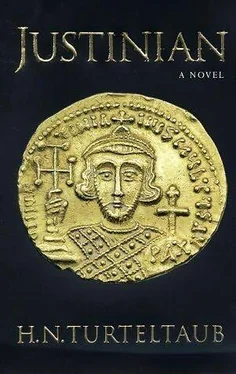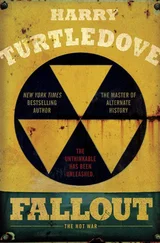Harry Turtledove - Justinian
Здесь есть возможность читать онлайн «Harry Turtledove - Justinian» весь текст электронной книги совершенно бесплатно (целиком полную версию без сокращений). В некоторых случаях можно слушать аудио, скачать через торрент в формате fb2 и присутствует краткое содержание. Жанр: Историческая проза, на английском языке. Описание произведения, (предисловие) а так же отзывы посетителей доступны на портале библиотеки ЛибКат.
- Название:Justinian
- Автор:
- Жанр:
- Год:неизвестен
- ISBN:нет данных
- Рейтинг книги:3 / 5. Голосов: 1
-
Избранное:Добавить в избранное
- Отзывы:
-
Ваша оценка:
- 60
- 1
- 2
- 3
- 4
- 5
Justinian: краткое содержание, описание и аннотация
Предлагаем к чтению аннотацию, описание, краткое содержание или предисловие (зависит от того, что написал сам автор книги «Justinian»). Если вы не нашли необходимую информацию о книге — напишите в комментариях, мы постараемся отыскать её.
Justinian — читать онлайн бесплатно полную книгу (весь текст) целиком
Ниже представлен текст книги, разбитый по страницам. Система сохранения места последней прочитанной страницы, позволяет с удобством читать онлайн бесплатно книгу «Justinian», без необходимости каждый раз заново искать на чём Вы остановились. Поставьте закладку, и сможете в любой момент перейти на страницу, на которой закончили чтение.
Интервал:
Закладка:
A moment later, as Irene scrambled off me, something hot and wet splashed down onto my leg. "Good," she said. "It fall out. Less chance baby." Now that our passage was done, she became all brisk practicality, getting into her drawers, tugging her tunic out from under me, and dressing with smooth haste. I did my best to imitate her.
When we were both clothed, she opened the storeroom door, saw no one in the hallway, and tugged at my sleeve so I would go out first. That made sense: she might have had- indeed, had had- some legitimate business in there, which was not true of me. The precautions, though sensible, were needless; the hall was so quiet, it might have been deserted since the palace was built.
She came out, closing the door behind her, and I- greatly daring, I thought- set a hand on her shoulder. "Can we do- this- again?" I asked.
She looked astonished. "You a prince, I a servant, a slave," she said, pointing out the obvious, as if she were telling me, This is the sun; that is the moon. "How I say no?" Then she looked worried, no doubt fearing I would be offended to think she gave herself to me only because of the difference in our ranks. "I do anyhow," she added. "Sweet, good, make me feel good."
Looking back, I still think some of that was true. At the time, I drank it down as if it were unwatered wine from Thasos. I felt nine cubits tall and five cubits wide, ready for anything, especially anything female. "Another time, then," I said grandly, and left her to get back to her work.
MYAKES
You did that very well, Brother Elpidios: only two or three coughing fits the whole time. What? Is that what my first time was like? Oh, not that different. I was a year or two older, and Maria was a maiden, too, so neither one of us was sure what we were doing, but we managed, so we did. I was on top, not the other way round.
How about you, Brother?… What? You never? Vowed chastity before you could even think about breaking your oath, you say? That's- very holy, Brother Elpidios. No wonder you're so curious about what the real thing is like.
How does it compare to what, Brother Elpidios? I tell you frankly, I don't know. Sorry I can't tell you, but I've never found out, nor been curious, if you really want to know. Eh? What's that? No, of course the abbot doesn't have to know you asked the question. Nothing wrong with curiosity, I sa y. If you weren't curious, you wouldn't be reading Justinian's book, isn't that right, Brother?
Yes, you can read some more now, if you've a mind to. When you read, I hear his voice inside my head. Isn't that strange? I remember it changing, just as he says.
JUSTINIAN
Not only did I seek out Irene whenever I found the chance, I also got in the habit of going around with a sweet bun or two from the kitchens. Having caught one fish with that bait, I went angling for others- and my luck, while not perfect, was good enough to make me a happy, or at least a sated, young man. Though the first lesson teaches most of all, I learned a good deal afterwards, too.
That was a happy time for me, that little stretch of years beginning my manhood: the happiest time I have ever known, save these past few years when I have found revenge a pleasure surpassing the love of woman, as the Psalmist said with somewhat different meaning to the words.
My father had the peace he desired, the peace he had bought and paid for. He took great delight in it, in spite of, or more likely because of, his growing bodily infirmity. Gout and stone continued to wrack him, though he was, or should have been, still in the prime of life, and he pissed blood after some of his attacks.
His physician, Peter, muttered darkly at that symptom, but Peter, I was discovering, was given to dark mutters at any excuse or none. A man's body can go wrong in so many ways, and God has given us knowledge to fix so few of them, that anyone choosing the physician's trade, if not a bit mad merely for entertaining the desire, will be driven so by the frustrations of his craft.
And yet… I touch my nose and I remember that not all the doctor's art is useless, or not entirely so.
In sickness and in health, as I said, my father maintained peace, both with the Empire's neighbors and within the church. This latter required some effort, for, as we learned a couple of years after the fact, when the bishops of Rome translated the acts of the sixth holy ecumenical synod into Latin for the benefit of the westerners too ignorant to have learned Greek, in the anathemas they mentioned Pope Honorius but deleted his title, so as not to have to acknowledge his heresy to that part of the world administered by the see of Rome.
On hearing that, I grew furious. "You ought to order the exarch of Ravenna to send troops down to Rome and force the pope to tell the whole truth," I said to my father.
But he shook his head. "For the sake of preserving the work of the synod, I shall practice economy here," he said.
Economy is the term theologians use for overlooking differences without doctrinal import. Without it, I suppose, there would be endless friction in the church, as if sand were poured into the gearing of a waterwheel. But too great an exercise of it countenances heresy.
I said as much to my father; I was at the age where I challenged him more freely than I had. He shook his head again. "The anathema against Honorius remains. He is who he is, and burns in hell for what he did, regardless of whether they give him his proper title."
I could not sway him, though I said, "Surely the pope who gave the order for this lie after sending bishops to the ecumenical synod will also burn in hell."
"Agathon, the pope who sent bishops to the synod, is dead, and facing the decrees of a judge greater than I," my father answered.
"His successor, then," I persisted. I had not heard that Agathon was no longer among men, but then Rome, being at the very edge of the Empire, seldom drew my notice.
And my father said, "His immediate successor, Leo, has also suffered the common fate of mankind. The new bishop of Rome, a certain Benedict, has in his brief time been a good enough man on the whole- one more reason to stay quiet about the way the anathemas were translated."
And, indeed, Benedict and my father exchanged a couple of cordial letters, my father writing in Greek, which the papal secretaries could render into Latin for the bishop of Rome (I hoped more accurately than they had the anathemas), and the pope in Latin, which, despite its being little used in these parts save in the army and, to a lesser degree, among lawyers, we managed to puzzle out.
One day my father summoned me and my brother Herakleios to the metropolitan's church near the palace, a crumbling wreck of a building seldom used for anything. I went unwillingly, for the summons meant I could not keep an assignation I had made with some girl or another: at fifteen, which I was then, you feel your life will be blighted forever if you do not dip your wick on the instant. But, had I disobeyed my father, I knew perfectly well what sort of unpleasant things would have happened to me, and so, though unwilling, I went.
I was surprised to find not only my father but also George, the ecumenical patriarch, awaiting Herakleios and me. I was even more surprised to find Theoktistes the barber waiting with them.
"What's this, Father?" I asked. "You're not making us into monks, are you?" Herakleios laughed at that- one of the few times I remember making him laugh- but I wondered if I was joking. Had my father decided for some secret reason of his own to be rid of us, what easier way than shaving our heads and clapping us into a monastery? Monastic houses are easy to enter, but hard to leave.
But my father shook his head. "No, hardly," he said, and I relaxed. He went on, "The bishop of Rome, this Benedict, has asked if he might become your spiritual father, and I have agreed." He made the sign of the holy cross. "A man can never have too many prayers in this world, and those from a good and pious man will surely be effective. As a token that I do agree to this spiritual adoption, Justinian, I will send him a lock of your hair, and one of yours, too, Herakleios."
Читать дальшеИнтервал:
Закладка:
Похожие книги на «Justinian»
Представляем Вашему вниманию похожие книги на «Justinian» списком для выбора. Мы отобрали схожую по названию и смыслу литературу в надежде предоставить читателям больше вариантов отыскать новые, интересные, ещё непрочитанные произведения.
Обсуждение, отзывы о книге «Justinian» и просто собственные мнения читателей. Оставьте ваши комментарии, напишите, что Вы думаете о произведении, его смысле или главных героях. Укажите что конкретно понравилось, а что нет, и почему Вы так считаете.












